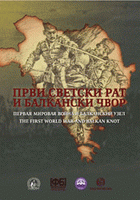Национална свест Срба пред Први светски рат
National Consciousness Of Serbs Of The Eve Of The Great War
Author(s): Slobodan G. MarkovićSubject(s): History
Published by: Institut za savremenu istoriju, Beograd
Keywords: Serbs; nationalism; national consciousness; ethnoreligious identity
Summary/Abstract: The paper deals with Serbian national consciousness, or how widespread was nationalism in the Kingdom of Serbia, at the beginning of the 20th century. The paper analyses the development of nationalism in Serbia by applying an A–B–C scheme elaborated by Miroslav Hroch. Ethnoreligious identity is seen as a basic identity in Serbia at the beginning of the 19th century and national consciousness emerged gradually only. The reason behind a relatively slow development of national consciousness in Serbia lays in unfavourable social and cultural conditions in Serbia including a high illiteracy rate and a low percentage of urban population. The paper includes quotes from Belgrade daily Politika indicating that by 1908 nationalism was fully established in the Serbian capital. This was confirmed during the First Balkan War in 1912. Attention is drawn to the fact at the beginning of the 20th century various social groups, but also ethnic Serbs in different parts of the Kingdom of Serbia had different levels of national consciousness. The situation was made even more complex when the Kingdom of Serbia acquired Old Serbia (Kosovo, Metohia and Sanjak of Novi Pazar) and Vardar Macedonia in 1912/1913. These areas were inhabited by both Christian and Muslim populations and they dominantly had ethno-religious rather than national identity. Therefore the conclusion of the paper is that majority of the population of the Kingdom of Serbia on the eve of the Great War was still not imbued by massive nationalism.
Journal: Zbornik radova Instituta za savremenu istoriju
- Issue Year: 2014
- Issue No: 12
- Page Range: 179-190
- Page Count: 12
- Language: Serbian
- Content File-PDF

